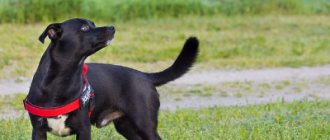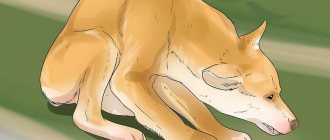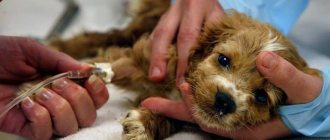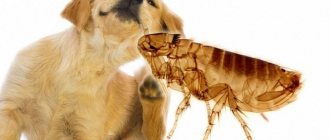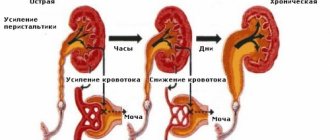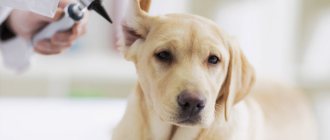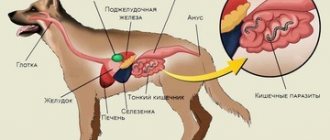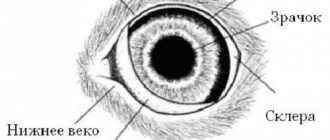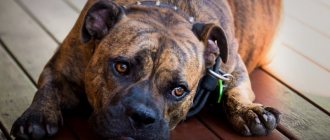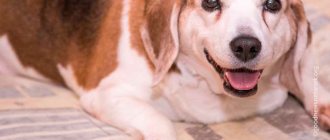What is dysbiosis
The term dysbiosis refers to an imbalance of the normal intestinal microflora. Normally, any animal has certain microorganisms, including bifidobacteria and lactobacilli. The function of microflora is to protect the body from pathogens that cause indigestion and other disorders in the gastrointestinal tract.
Under the influence of a number of reasons, the ratio of beneficial microbes changes towards a decrease, and the pathogenic flora becomes more numerous, which is how dysbacteriosis occurs. With the development of such a disorder, not only digestion changes, but the immune system also suffers, which entails the occurrence of a variety of diseases.
Dysbiosis in dogs: causes, symptoms, treatment
Probiotic therapy
Dysbiosis in puppies and adults can be treated with human and veterinary probiotics. Among the most effective veterinary medications, doctors identify:
- Vetom 1.1;
- Fortiflora;
- Lactobifid;
- Lactoferon;
- Multibacterin Omega 10.
An alternative to veterinary medications are probiotics, which can be purchased at regular pharmacies:
- Linux;
- Bifiform;
- Bifidumbacterin;
- Bificol
- Probinorm;
- Baktisubtil;
- Lactoferon;
- Lactobifid.
Causes of dysbiosis in dogs
There are many reasons leading to dysbiosis in dogs.
Main reasons:
- Poor nutrition, and especially the presence of a large amount of carbohydrate food in the dog’s daily diet.
- The influence of stress.
- Parasitic diseases.
- Irrational use of medicines. Dysbiosis often develops when dogs are treated with antibiotics for a long time.
- Poor environmental conditions in areas where animals live.
If a dog’s body is affected by several unfavorable factors at once, then the likelihood of disruption of normal microflora increases many times over.
That is why, when treating with antibiotics, it is important not only to follow all the doctor’s recommendations, but also to devote more time to selecting food for your pet.
Conclusions about dysbiosis
Dysbacteriosis is a common phenomenon. The problem can also occur in a completely healthy individual, but you need to be careful and start treatment quickly. It is worth saturating your diet with fresh vegetables, healthy cereals, dairy products, visiting the veterinarian on time and following his recommendations. In spring and autumn, it is imperative to pay attention to the prevention of worms and infections in the dog’s body.
Such methods will reduce the risk of dysbiosis, and the dog’s intestines will work well. If a disease is detected, there is no need to self-treat; it is better to consult a specialist. If you look after your pet, feed and care for it correctly, you will prolong its healthy and happy life.
Currently reading:
- 13 Causes of Indigestion and Diarrhea in Dogs
- Thyroid dysfunction in dogs (hypothyroidism)
- Seven Signs and Remedies for Getting Rid of Fleas in Dogs
- Ways to combat ringworm or ringworm in dogs
Symptoms of dysbiosis in dogs
Mild dysbacteriosis may not result in any changes in the dog’s well-being for a long time. But sooner or later the ratio of beneficial microorganisms changes towards their sharp decrease and this causes a number of manifestations of the disease. Dysbacteriosis in dogs mainly occurs as enteritis or intestinal disorder.
Symptoms of dysbiosis:
- Decreased appetite. In severe cases, the dog will refuse to eat altogether.
- Increased gas formation and bloating.
- Diarrhea or vice versa constipation. Pieces of undigested food can be found in the animal's feces.
- When you feel the abdomen, you feel its hardness, and the dog reacts to this action as if it were a painful procedure.
The health of a dog depends on the state of the microflora in the digestive organs.
If you suspect dysbiosis in your pet, then the first thing to do is to come to the veterinarian with the problem. The specialist will be able to carry out a number of diagnostic procedures, based on which he will determine the cause of changes in the dog’s health and select treatment accordingly.
Dysbacteriosis: causes, course, solutions
What to feed a dog with dysbiosis
It is impossible to cure dysbiosis in a dog and its accompanying diseases without changing the pet’s diet. Animals that ate industrial croquettes should receive a special medicinal brand of food during the period of restoration of the gastrointestinal tract:
- Royal Kanin Gastro Intestinal;
- Proplan Veterinary Diets;
- Hills i/d.
For pets who are on a natural diet, the basis of the diet should be rice, buckwheat, chicken breasts without fat, beef, vegetables, and kefir. A veterinarian will help you create a menu for your animal and a feeding schedule.
For diseases of the intestinal tract, the animal is given fasting days. At the same time, the pet must have constant access to fresh and clean water.
When modifying the diet, you should regularly monitor the condition of the animal and changes in the composition of feces.
Complications
Long-term dysbacteriosis leads to the development of symptoms of intoxication, which are manifested by an increase in body temperature and a decrease in motor activity. If left untreated, dysbiosis itself becomes the cause of a number of pathologies.
Complications caused by dysbacteriosis:
- intestinal inflammation;
- stomach ulcer;
- frequently occurring infectious diseases;
- allergic reactions;
- disruption of the liver and urinary organs;
- decline in visual function.
Prognosis and possible complications
Treatment of dysbiosis is quite extended in time and in some cases it takes more than one month to completely restore the positive microflora of a dog’s intestines. This period can be reduced as much as possible only with strict adherence to all recommendations of the veterinarian and careful care of the animal, not only during the treatment period, but also during further prevention of re-development of the disorder.
The lack of a timely response to the problem threatens to aggravate it, with the development of many other concomitant diseases in the pet’s body. First of all, these are gastritis, pancreatitis, dermatological ailments and various allergic reactions. All these disorders can be visually noticed by the deterioration of the condition of the dog’s coat, its severe exhaustion and the decrease in the body’s immune forces, as a result of which the owner has to treat his pet much more often for a variety of viral and infectious diseases. In rare cases, the combination of all the problems initially associated with intestinal dysbiosis leads to death.
We recommend reading, symptoms and treatment of gastritis in dogs.
Treatment of dysbiosis in dogs
The most important thing that dog owners need to understand is that there is no single treatment regimen for dysbiosis. The veterinarian selects medications and prescribes a diet based on test data that allows you to determine the ratio of beneficial and pathogenic microflora.
The main stages of eliminating dysbiosis:
- Removing pathogenic microflora and toxins from the body.
- Restoration of beneficial microflora.
- Normalization of digestive processes.
- Strengthening the immune system.
In order to restore microflora and improve digestion, dogs are prescribed probiotics, such as Bifitrilak and Ecoflor. If necessary, enzymes are used to help digest food. During the treatment period, a special diet is prescribed with the exception of dry food. Animal food should be easily digestible. It is recommended to constantly feed fermented milk products.
Dysbiosis in dogs: symptoms and signs, treatment
In order to completely normalize the ratio of beneficial and harmful microorganisms, it is necessary to eliminate the influence of the main cause of the disease on the dog. That is, the animal should be rid of parasites, avoid exposure to stressful situations, and give medications only as prescribed by a specialist.
Dog owners should prepare for the fact that treatment of dysbiosis may take several weeks or even months. Much of the recovery will depend on how correctly the veterinarian's instructions are followed and on the pet's nutrition.
After a course of therapy, it will take a lot of time for the immune system to stabilize and for the animal to get rid of disturbances in the digestive process.
Treatment and prevention of intestinal dysbiosis
There is no aggressive treatment for dysbiosis; the recovery process is usually long and requires the patience of the owner. Parallel developing diseases are treated with medication. There are many drugs for the treatment and prevention of dysbiosis, most often they differ in price and spectrum of action. At the same time, enzymes, a vitamin complex, immunostimulants, and antihistamines are prescribed. Among the popular and respected drugs for the treatment of dysbiosis are:
Prevention of dysbiosis in dogs
Dysbacteriosis can cause many problems, so dog owners need to prevent the development of this pathology. To do this, you should feed your pet well, and the food should be varied, well digestible and fortified. Excellent immune function is also the key to the absence of intestinal problems. When treating with antibiotics, you should use only the regimens suggested by your doctor, and to prevent microflora disturbances, give your dog probiotics in advance.
Reviews from veterinarians
“Dogs do not have such a disease as dysbiosis. Symptoms that are mistakenly considered to be a manifestation of dysbiosis signal disorders such as helminthic infestations, intestinal infections and inflammatory pathologies of the gastrointestinal tract. The dog is treated only after a full diagnosis has been carried out and the cause of the malfunction in the digestive system has been identified. Regardless of the reason, probiotics and prebiotics are mandatory. Despite the fact that bacteria coming from outside do not take root in the intestinal microflora, they help to quickly normalize the functioning of the gastrointestinal tract.”
Dysbacteriosis is not an independent disease. The syndrome is often disguised as other pathologies and infections of the gastrointestinal tract. Only timely diagnosis and therapy increase the chances of a dog’s full recovery.
Sources:
https://vashipitomcy.ru/publ/sobaki/bolezni/disbakterioz_u_sobak_simptomy_i_sposoby_lechenija/26-1-0-710 https://realpet.ru/zdorovie/disbakterioz-u-sobak.html https://dogipediya.ru/veterinariya/ zabolevaniya/disbakterioz-kishechnika-u-sobak
Prevention
The following preventive measures will help prevent relapses of dysbiosis:
- deworming 2 times a year;
- timely detection and treatment of gastrointestinal pathologies;
- taking a course of probiotics after antibiotic therapy;
- feeding with high-quality super premium or holistic food.
At the first signs of a disturbance in the functioning of the digestive organs, it is necessary to contact a veterinarian to identify the cause, and put the dog on a therapeutic diet.
